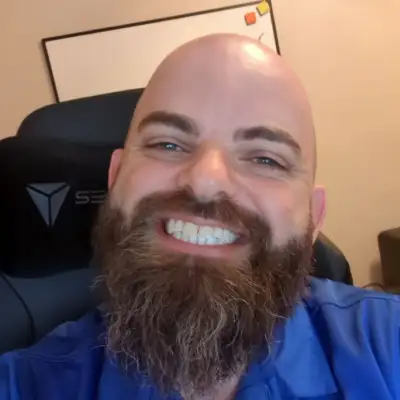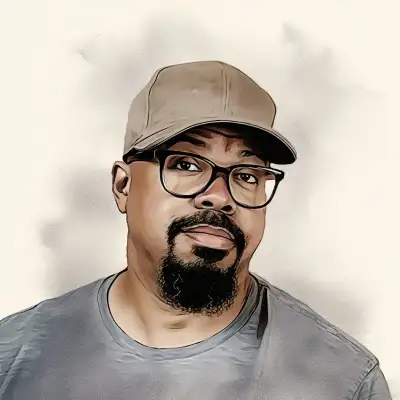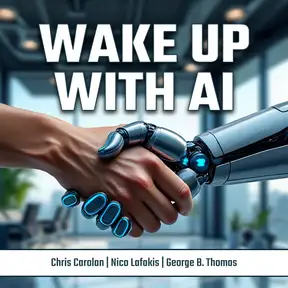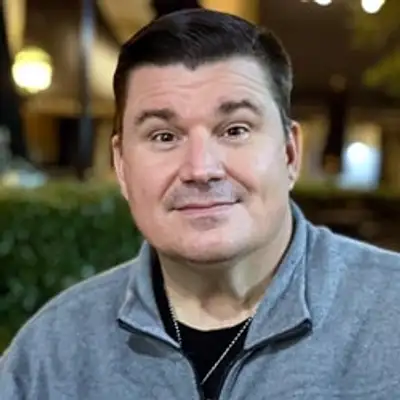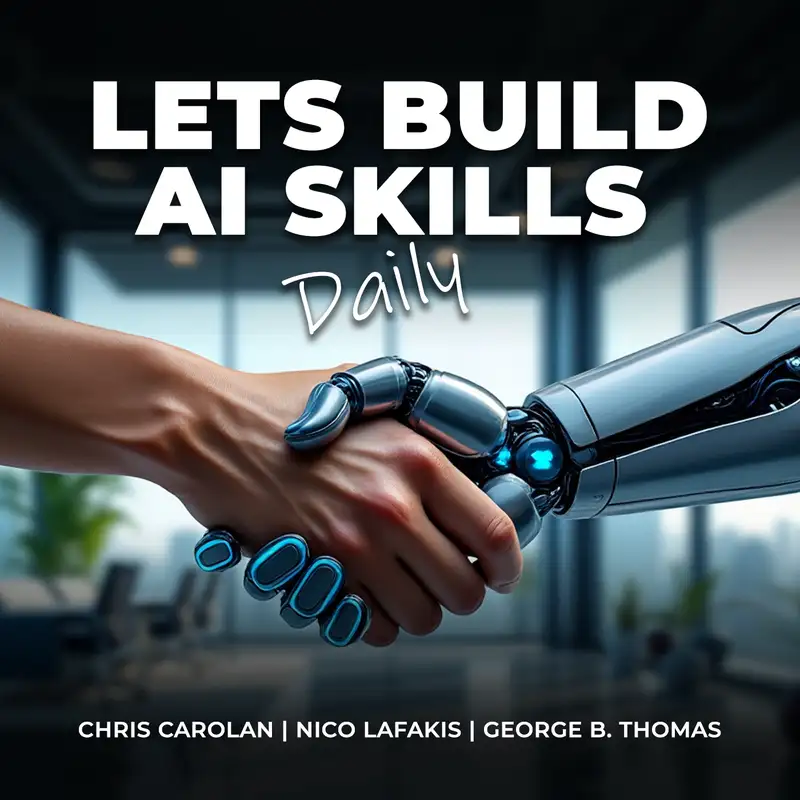
Utility Intelligence, Entrepreneurial Mindset, and GPT Canvas
Welcome to wake up with AI, the podcast where human powered meets AI assisted. Join your hosts, Chris Carillon, Niko Lofakas, and George b Thomas as we dive deep into the world of artificial intelligence. From the latest AI news to cutting edge tools and skill sets, we are here to help business owners, marketers, and everyday individuals unlock their full potential with the power of AI. Let's get started.
Chris Carolan:Good morning. Happy Tuesday, October 15, 2024. It's time to wake up with AI here with Niko and George. How you fellas doing today?
George B. Thomas:I'm feeling great today. It's, Tuesday in a never ending world of possibly future Tuesdays. So
Nico Lafakis:Likewise. Feeling feeling very good. Crisp this morning. It is a crisp 45 degrees outside, so I love it.
George B. Thomas:Chilly here too. Yeah. Yeah.
Chris Carolan:Yep. Gonna be 98 today in Houston. Unseasonably warm.
George B. Thomas:I'm gonna brag without bragging, I think, right now.
Nico Lafakis:Oh, there's that, like, full on curve that's going from, like, Michigan straight down to Texas. I saw that. I was just like, oh, okay. So, like, literally, from the Midwest over, we're all nice and cool. And from the Midwest over to the west, you all are faking alive.
Chris Carolan:Yeah. High of 98, low of 57. Really? Today. So how can AI help us with that?
Chris Carolan:What are we talking about today?
George B. Thomas:Climate change. Yeah. Large language model.
Nico Lafakis:I mean, how do we do this? Did you watch the video before we start?
Chris Carolan:I did not.
Nico Lafakis:No. But, like, that's that's what's weird. I shouldn't say how do we do this. It's really how do I do this because I I'm in it so much that everything. You talk to me about anything.
Nico Lafakis:Talk to me about turtles. I will tell you something that's AI related to the turtles and that, like, yeah. We're using AI to actually study the walking path of the turtles so that we can understand why do turtles cross the road.
George B. Thomas:To get to the other side.
Nico Lafakis:Yeah. To that point, I was watching a a video from Mogadot, and he was talking about just, like, what happens when when things move forward. And he was using this analogy of electricity, and he's like, well, you know, we have electricity as this utility that we plug into, and we can do all these great things with it. And that's what's about to happen with intelligence, that we're going to be able to tap into this increased intelligence whenever we want to. And he went forward to say, okay.
Nico Lafakis:But what does that look like? It's like, you know, currently I I go home and I tap into this intelligence and it's about another 25 IQ. Very soon it's gonna be that I tap into it and it's a 100 IQ. And then not too long after that, that's the funny part. Right?
Nico Lafakis:As you go from 25 to a little bit of time makes a 100 to a shorter amount of time to 100 gets you 400. And he says at 400 IQ, I can solve all of the world's problems. Everything. Anything you can think of. Wow.
Nico Lafakis:Climate change, global warming, monetary issues, poverty, everything to the question of, like, okay. Well, how do we solve these problems?
George B. Thomas:Here's the thing. My brain goes in a very interesting direction when you when you say that. Because IQ, yes, but only if you know the right questions to ask. You know what I mean? There's an important piece to that of, like, well, if you want to, then how do you, and what is the chain of questions to get you there?
Nico Lafakis:That's a tidbit. My, big thing today is, is something that we skipped over actually, and I did want to show on people. I shouldn't say that we skipped over, but we, like, talked about it, and we didn't actually show anybody, which is a little unfair for anybody that's listening, but, you know, that's them's the breaks. I will definitely talk through it as we as we go through it, but I definitely wanted to show people, like, what is Canvas? What is this thing they've been hearing about?
Nico Lafakis:What does it do? Why is it so different from, like, the regular version of g p t, and what's so big deal about it? Canvas is a much smoother way, I guess, George, of working on things as you as you go along. We'll just do something really simple when I say smoother way of working with things. If you've worked with Anthropics Quad and you understand how artifacts work and the way that it breaks things out into a whole separate sort of window that you can use, then this is very similar to it, but artifacts are more of like a copy paste element than they are something that's a live working document, which is really what Canvas is much more like.
Nico Lafakis:It's almost like an open working document that you have. So
George B. Thomas:Niko, before you go ahead and type your thing while you're typing, I wanna just hit something because we're so used to go on to Chechipti, typing our thing and hitting enter. I want everybody to realize on Canvas, and it's small, but I think it's on purpose, there are these buttons underneath your chat now that are, like, create image, get advice, summarize text, analyze image, code, brainstorm, surprise me, help me write. Like, they're giving you some jumping off points to kind of leverage rather than just going in and, like, immediately typing your question or your statement or whatever you're trying to do and hit enter. So slow down sometimes to look at the new interface, ladies and gentlemen.
Chris Carolan:I remember one of the worst feelings when you started using AI are these chats is when it would, like, just whatever the prompt was, like, nail it. Just nail the answer, except, like, few words were not what you needed, and then you could not get it to reproduce anything close to the original answer. Right? Same prompt, everything comes back some different. You're like, oh, how did we get here?
Chris Carolan:Right? So this ability to edit is just amazing to think about.
Nico Lafakis:It really is. And so what what I've done is I've just given it a prompt very basic that, hey, we're working at Betty's Bites or Becky's Bites. It's a bakery and we're selling a new chocolate chip butterscotch cookie and we're trying to put together some new copy for an email that we're sending out in a in a newsletter. So we've put out the copy. It's very, very basic.
Nico Lafakis:And while we're looking at it, you can highlight the section itself. Right? And you can click on that and you can either edit this section here or you can actually ask GPT to explain it. So let's go ahead and click on this and we'll explain. We'll say, can you explain the use of this copy?
Nico Lafakis:Right? And so so then back in the main window, it's split open into 2 windows. We have this large canvas that's open and we have this smaller column over to the left that's open. When I asked it if it could explain the text, it now comes out and says, okay, the selected text is actually the call to action that we're using and it's designed to entice customers to visit Becky's Bites. Be one of the first to create urgency, and then uses your taste buds will thank you, adds a friendly, reassuring tone, making it more inviting and appealing to the reader.
Nico Lafakis:So this is the instance where maybe you're asking it I seriously, I love how these things line up. When George is like, you have to know how to ask the right questions. Maybe not anymore. Right? If you think about this from, like, a a teaching tool perspective, this is probably one of the greatest teaching tools that I've seen in a long time, especially when it comes to being able to write term papers, writing essays, writing any sort of long form content, and then being able to have the explanation come back to you of why it wrote something in a particular way or what it meant by what it was writing.
Nico Lafakis:The reasoning that goes on behind that, I don't think that there's a whole lot there. I think really what you're looking at here is just an output of the algorithmic thinking that put this together as opposed to it telling you, like, yeah. Well, I was thinking about this while putting that together. Like, it's I don't quite think it's that yet.
George B. Thomas:So I have to throw in here something because I'm kinda breaking my own brain sitting over here watching you do this because this all started with a generated prompt to create the thing. But when you did that and it said, this is a CTA, I all of a sudden was like, well, what if I actually got in here and I pasted my competitor's email and then started asking it, like, why is my competitor doing this email this way? And is there a way that you can optimize my competitor's email, but actually make it for my organization? And so, like, dissecting and then optimizing in this tool to me gets real interesting.
Nico Lafakis:Yeah. That's the whole thing is the the iteration at this point becomes much more fluid, much more rapid. And so that's just like clicking into the text, and again, we can we can also rewrite and we can, edit this and say we'll do something really vague. I kinda love doing vague on on demos at this point. So we're gonna say turn up the volume on this.
Nico Lafakis:I'm not even I couldn't even tell you. Okay. So what's happening is instead of it rewriting an entirely new email, an entirely new email copy, what happens in Canvas is it just rewrites that section that you're asking it to do. So we don't have to worry about yeah. We don't have to worry about, like, wasting tons of tokens now.
Nico Lafakis:We only have to put the tokens into this section. That's actually as a result of, I believe, couldn't say for sure, but it's essentially like a cached method where it's caching the rest of the response. And you can see that it's broken it down into various sections, So it's like each other one is cached and it only has to change out the one that you're asking it to. So it's rewritten the copy and it's pumped it up a little bit, talked about how the cookies are now irresistible, and you know, sink your teeth into them and all that kind of stuff. So The
Chris Carolan:taste buds will explode with happiness.
George B. Thomas:Yeah. I'm I'm gonna That's an effective story, man. This episode.
Nico Lafakis:Early this morning and already people are are hungry for cookies. Okay. So outside of just the inline stuff, you also have these additional options down in the lower corner where you can suggest different types of edits that you might wanna make. Right? So if you don't know what kind of like edits, you could say like adjust the length or change the reading level.
Nico Lafakis:I know that George loves this one.
George B. Thomas:I love that one.
Nico Lafakis:So the reading level here, I'm not even sure what it's at. We can check keep current reading level, or we can just adjust this slider, and we can say bring it
George B. Thomas:down for high school, by the way. I want everybody to pay attention to that. The default is high school reading level.
Nico Lafakis:Somewhere in between. It's like middle school and then high school.
Chris Carolan:I love to see this raised all the way up, actually.
George B. Thomas:Oh, jeez. Yeah. Let's go nerdy and take it all the way up for this email.
Nico Lafakis:I I wanna go bottom to top. So this is supposed to be it. I I don't know. I don't know what you would call this, but, like, to me, in between middle and high school is what I use when I'm writing. I don't know if anybody else does this.
Nico Lafakis:Maybe because I'm so awkward. I don't remember. We have this thing way when I was young called water cooler talk, and that's what I use as a descriptor. When I write emails or I write something that I want to be, like, generic for adults, I say, write this as if it was water cooler talk, and it puts it in that lingo. It uses general lingo that everybody knows, that everybody's gonna be able to understand.
Nico Lafakis:So we're gonna go with, kindergarten level and just see what that looks like by comparison to what we had before. Hi, cookie friends. We make super yummy cookie just for you. It's like a chocolate chip cookie, but even better. On the Becky's bites, be the first one to try a tasty cookie.
Nico Lafakis:It made it crazy, crazy simple compared to what we had before. And now what I wanna see is the graduate school levels. We'll go ahead and just pump that up.
Chris Carolan:Any marketers out there needing help with targeted messaging at kindergartners
Nico Lafakis:Yeah. Or if you were
Chris Carolan:to get them to come into the cookie store.
Nico Lafakis:It's like outside of that context. What if you were trying to write a children's book and you had some really complicated story. Right? So you could take something like, I'm not even joking, like, context window wise. I'm not saying you can do this with GPT.
Nico Lafakis:If you have your own model built out, you could. If you have your own assistant, you could take something like Lord of the Rings and break it down into a a complete children's novel.
George B. Thomas:See, I went with The Matrix. I was like, let's make The Matrix into a child novel. But yeah.
Nico Lafakis:Yeah. So we pumped this up to a graduate level, and, the They're a
George B. Thomas:little more talkative, I'm noticing.
Nico Lafakis:A little bit more talkative, and, the descriptions far longer. The And
George B. Thomas:this is a novel confection.
Chris Carolan:Yeah. This screams without knowing level of writing. Like, if somebody were to read this, they would yell at us for marketing speak, like
George B. Thomas:Jargon.
Chris Carolan:Big word jargon. Like, that's what this, like, introducing a novel confection at Becky's Bites, an analytical perspective on flavor fusion.
George B. Thomas:You know, I never think of analytics when I'm eating a freaking cookie.
Nico Lafakis:Can I just throw that out there? So Let
George B. Thomas:me do the math of how these morsels are bursting in my taste buds.
Nico Lafakis:That doesn't that doesn't happen. I just love the, achieves a balance of textural and gustatory nuances offering a multifaceted sensory experience. Like, wow. Seriously? What?
George B. Thomas:Let me go get some right now.
Nico Lafakis:Oh, yeah. I'm not sure I've ever used that to describe oh, yeah. The omelet was so multifaceted. It was unbelievable.
Chris Carolan:But just to, like this is why when we talk about strategy related to, like, audience building and, you know, ideal client profiles and messaging and personas, you have all the tools now. If you understand that there's 3 people, 3 distinct audiences that you have to be talking to, The decision to actually create content that speaks to them is the hardest part because we just saw how easy it could be to just change it like that. Right? And this is outside of of HubSpot or whatever tool you might be using. This is the kind of stuff that you can start doing in tool and automating.
George B. Thomas:Oh, god. You didn't. Why did you do that? Why did you hit the emoji button?
Intro:I hate
Nico Lafakis:that button.
Chris Carolan:There's an emoji button.
George B. Thomas:The dumbest button.
Nico Lafakis:Emoji button. I kinda did it just to show people why. Right? Like, please don't because it's gonna get nasty.
George B. Thomas:It should literally say vomit emojis. That's what it should say because it it just overdoes it. So If
Chris Carolan:you're listening to this, like, please find the video version of this podcast. Man, it must be our top box.
Nico Lafakis:There would have been cookie yeah. Wherever there would have been the word cookie is that emoji that's a that is a cookie, and then wherever it did say chocolate, there's a chocolate box.
Chris Carolan:It's like Emojis.
Nico Lafakis:Just decided to plug and play.
Chris Carolan:Emojis are like pop ups. Like, so easy to hate. Yeah. But so
Nico Lafakis:You know it's marketing when you see it. Right?
Chris Carolan:They're also super effective when used properly. Properly.
Nico Lafakis:The sick part about this, right, is that, like, we made a mistake. Clearly, we made a mistake. And normally, we'd have to regenerate the whole thing, ask it to try to do the last version, hope that it comes back properly or whatever.
George B. Thomas:I love this.
Nico Lafakis:Now we have the previous version. We have an undo button.
Chris Carolan:That's it. You so much.
Nico Lafakis:You can say back to the latest version that you were wanting to or restore this version. Right? And then we can just restore it, and we're good.
George B. Thomas:So nice. So Once again, it goes to the caching or something's being, like, remembered or held somewhere. So
Chris Carolan:So help me with my top question then. Why shouldn't I just move everything I'm doing in Claude over to GPT?
Nico Lafakis:I can't remember if I said this yesterday or not. I think I said it in in another show or to somebody else. But it's a race to intelligence. Right? In all of these things, in all of these models, it's a race to intelligence.
Nico Lafakis:There is something to be said, like, why would there be different models? Because there are different ways of thinking about things. There are different ways of approaching problems. Will there eventually be one to rule them all? Yes.
Nico Lafakis:Because you're shooting for the exact same goal, so even if there's one that thinks differently than another, it's not like humans. To me, that's the equivalent of one agent. It's just a way of thinking, so you can just chain millions of them together and think about it. Like eventually one of these things will be one Doctor Strange that can see all of the possibilities at the same time. Not one after the other.
Nico Lafakis:It won't be sitting there meditating for a while. At the same time, it will read every book in Congress. Right? Like in the Library of Congress. Right?
Nico Lafakis:Every page. K? That's where we're getting to. So I I think yeah. Eventually, I I think you you know, not that you shouldn't, but just realize, like, one of these tools is going to eventually be the the dominant one.
Nico Lafakis:In my opinion, we've looked at the stats. You know, OpenAI is going to continue to be the leader. And if Kwan does get ahead, it'll just be for a moment.
George B. Thomas:Here's the thing. I know that I'm quickly turning into a nerd because you know what I dream about? I dream about when it's o one preview plus canvas. Oh my god. The creation process with that thinking and my direction and being able to do corrections?
George B. Thomas:I just I need a minute.
Nico Lafakis:Tell me to please tell me this somehow rolls into the skills of paper bills.
George B. Thomas:Well, it's see, there's an undertow, though, this entire thing, because there's a mindset. There's people. I reflect on myself on this one, and and even you guys. Like, there's there's a level of this. So, anyway, with that said, you know what time it is.
George B. Thomas:It's time for the skill that pays the bills. Today, we're actually diving into something that is seriously important to me, and, actually, it fires me up, the entrepreneurial mindset. Now if you're a business owner, a start up founder, or just someone who has that deep down hustle, like Chris and Niko, you already know that staying ahead of the curve isn't just important. It's everything. And let me tell you, in today's world, staying ahead means knowing how to harness the power of AI to fuel your business growth and uncover new opportunities.
George B. Thomas:Those are the words I want you to remember today. Here's the kicker. AI isn't just for the big tech giants anymore. It's for the scrappy entrepreneurs, the small businesses, and the dreamers who are ready to scale and make their vision a reality. So let's put this into perspective.
George B. Thomas:Imagine you're running a business. Maybe it's a small ecommerce shop or maybe it sells cookies online, a service based agency, or even a personal brand. You've got a lot on your plate. Right? Managing your team, handling customer service, keeping track of finances, all while trying to grow your business, and, frankly, that's a lot.
George B. Thomas:But what if I told you that AI could take some of that weight off your shoulders while also giving you insights and tools you need to grow faster and smarter? We were actually talking about this in the green room before we hit record. Picture this. You're launching a new product or service. AI can help you analyze market trends, predict customer behaviors, and even spot opportunities, there's that word again, you might have missed.
George B. Thomas:You can automate customer interactions, streamline your operations, and use data driven insights to make sharper business decisions. With AI, you're not just growing your business, you're growing it with precision and purpose. Here's where the entrepreneurial mindset really shines. Entrepreneurs are natural risk takers and innovators, but with AI, you don't have to fly blind. You can use AI tools to minimize risks and maximize growth, where it's using AI to analyze new markets, craft personalized marketing campaigns, or forecast your financial future.
George B. Thomas:We'd like to forecast that financial future. The possibilities here are endless. It takes the natural entrepreneurial drive and AI supercharges it. Think about launching a new product line. You could use AI to test waters before even releasing it.
George B. Thomas:Now you've got data backed approach that makes scaling your business faster and more effective. Now before we wrap up, let me hit you with 3 key takeaways for today's skill that pays the bills. AI is a growth accelerator. Whether you're starting a new venture or scaling an existing business, AI can automate repetitive tasks, analyze market trends, and help you make smarter, faster decisions that drive growth. Stay agile with AI insights.
George B. Thomas:You as the entrepreneur need to be flexible and adaptable, and AI gives you real time data that helps you pivot quickly, whether it's refining a product or shifting your go to market strategy. And third thing to think about is reduce risk, increase opportunity. AI lets you make data driven decisions, cutting down the guesswork and helping you uncover new opportunities, whether it's breaking into a new market or opportunities, whether it's breaking into a new market or launching a fresh service, product, or even framework. Ladies and gentlemen, entrepreneurial mindset, that's the AI skill that pays the bill for today.
Chris Carolan:If you've been thinking about building a business or, like, maybe you're in a job that is all about all about billable hours and that's not jiving with you right now, I think this relates to just a message that popped into my mind yesterday, and it's like, if you make your money, if you create success, say, behind the scenes or in the margins because you're a better negotiator, because, ultimately, you have information that the other person does not. Are you done? Like, do you have to adjust that? Because for me, we get to a point where the only thing behind the scenes is AI. Right?
Chris Carolan:So there's no space to play, like, to make your money, to be profitable, to leverage things that maybe aren't in the best interest of the person you're dealing with. Right? When everybody has this level of knowledge and access, like, there's no space to play. So everything's gonna be out front. There's gonna be no option that there's not gonna be behind the scenes.
George B. Thomas:There's always gonna be behind the scenes in my mind. And this is literally the thing that I'm gonna say. I have contemplated on going online several times live just to show the behind the scenes to get where I'm actually getting with what I'm getting. Because and I say this humbly. I have these moments where I'm like, wow.
George B. Thomas:Wow. Did we just do that together? Is that really what we just came up with? And then I think about, like, how I got there with the creativity and the questions and the informing and the chaining and the foundational pieces. And, like, if people understood that you can have this bank of information, but if you don't have the creativity, if you don't know the questions, if you don't have the foundational pieces like personas and this and that, these magical moments, these behind the scenes, Chris, I don't think they happen for everybody.
Chris Carolan:But what I'm suggesting is the difference between you and maybe somebody else that I'm describing right now is that you have thought about going live because you cannot handle you being the only person that understands the value of what's happening.
George B. Thomas:Yes.
Chris Carolan:Right? Versus others and managed services come to mind. Like, the whole concept of creating something that you need for your business that you cannot maintain or manage without me. Right? That's the part that's going away.
Chris Carolan:And that's where it forces somebody like, I'm glad you put it that way because at some point, it might not even bet be that strategic. It might be table stakes for you to be showing your work in the way that you just described because that's the only way to say why is this different from AI. Like, what what's what's different here? So it will be no more, like, behind the scenes in that from that perspective is where I'm coming from.
George B. Thomas:Man, all's I know is it's time to wake up. That's that's what I'm saying. Come on, bro. Thing.
Nico Lafakis:Yo. It's having some peace behind it.
Chris Carolan:It is time to wake up with AI. We hope you enjoyed another show, and have an awesome Tuesday, everybody.
Intro:That's a wrap for this episode of wake up with AI. We hope that you feel a little more inspired, a little more informed, and a whole lot more excited about how AI can augment your life and business. Always remember that this journey is just the beginning and that we are right here with you every step of the way. If you love today's episode, don't forget to subscribe, share, and leave a review. You can also connect with us on social media to stay updated with all things AI.
Intro:Until next time. Stay curious, stay empowered, and wake up with AI.
Creators and Guests
